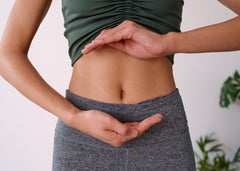Growing up and going through puberty is an exciting yet challenging time for teenage girls. A milestone of this journey is experiencing your first period. While it's a natural and normal part of being a woman, the thought of it can be pretty scary for many young girls.
In this blog post, we hope to provide guidance, insights, and tips to help teenage girls navigate this phase of their lives with confidence and understanding.
Understanding the Basics
Before we dive into the details, let's start with the basics.
What Is a Period?
A period, also known as menstruation, is a regular discharge of blood and tissue from the inner lining of the uterus. It happens around once a month, but it's different for everyone. It's a sign that your body is growing and changing, getting ready for the possibility of having a baby someday. While it might feel strange or uncomfortable at times, it's completely normal and nothing to be worried about.
When Will It Start?
One of the most common questions among teenagers is, "When will I get my first period?" The answer varies from person to person, but here are some common standards:
Age
Most girls get their first period between the ages of 9 and 16. However, it's important to remember that everyone is unique and has no one-size-fits-all timeline.
Family History
Your family history can offer some clues. If your mother, sisters, or other female relatives started their periods at a certain age, you might follow a similar pattern.
Tanner Stage
Doctors often use the Tanner stages to assess sexual maturity. The onset of breast development (Tanner Stage 2) indicates that your first period may be approaching.
Dealing with Period Pain
It's common for girls to experience discomfort or pain during their periods. This is known as dysmenorrhea. The pain can range from mild to severe, including cramps, backaches, headaches, and mood swings. Here are some strategies to help alleviate period pain:
- Over-the-Counter Pain Relievers: Non-prescription pain relievers like ibuprofen or naproxen can help reduce menstrual pain.
- Heat Therapy: Applying a heating pad or hot water bottle to your lower abdomen can relieve cramps.
- Exercise: Engaging in light physical activity, such as walking or yoga, can help reduce period pain.
- Relaxation Techniques: Practicing relaxation methods like deep breathing or meditation can help manage stress, which can also reduce period discomfort.
Managing Menstrual Hygiene
When you have your period, it's essential to maintain good menstrual hygiene to stay comfortable and healthy. Here are some key aspects to consider:
- Sanitary Products: There are various hygienic products available, including pads, tampons, menstrual cups, and period underwear. Choose the one that suits you best.
- Changing Regularly: To avoid leaks and discomfort, it's crucial to change your sanitary product regularly. Most products need to be changed every 4-8 hours.
- Washing: Keeping your private area clean is essential. Use a mild soap and water to clean the area gently during your shower or bath.
Emotional Well-Being
Your emotional well-being is just as important as your physical health during your period. Mood swings and emotional changes are common due to hormonal fluctuations. Here are some tips for maintaining your emotional well-being:
Self-Care
Engage in self-care activities that help you relax and destress. This could include reading, taking a warm bath, or spending time with loved ones.
Healthy Diet
Eating a balanced diet with plenty of fruits, vegetables, and whole grains can help stabilize your mood.
Stay Active
Regular physical activity can boost your mood and reduce feelings of sadness or irritability.
Talk About It
Don't hesitate to talk to a trusted friend, family member, or counselor about any emotional challenges you're facing during your period.
Irregular Periods
While it's normal for your periods to be irregular during the first few years after they start, there are situations where irregular periods might indicate a problem. If you experience any of the following, consider seeking medical advice:
- Very Heavy Bleeding: If you're changing pads or tampons every hour or two, it could be a sign of a problem.
- Severe Pain: Extreme pain that doesn't improve with over-the-counter pain relievers may need medical attention.
- Missed Periods: If you miss your period for three months or more, consult a healthcare provider.
- Bleeding Between Periods: Any unusual bleeding between periods should be addressed by a healthcare professional.
Talking to Parents or Guardians
Discussing your period with your parents or guardians might feel awkward, but remember that they were teenagers once, too. They can offer valuable guidance and support. Here are some tips for approaching this conversation:
Choose the Right Time
Find a quiet, relaxed moment to bring up the topic when you're both comfortable.
Be Honest
It's okay to admit you feel embarrassed or nervous about discussing it.
Ask Questions
Don't be afraid to ask questions or share any concerns you may have.
Use Resources
If you're not comfortable talking in person, there are plenty of books, websites, and educational materials that can help you learn more.
Conclusion
Experiencing your first period is a significant milestone in a girl's life. It's essential to approach it with knowledge, confidence, and self-compassion. Remember that every girl's experience is unique, and there's no need to feel ashamed or embarrassed about it.
By understanding the basics, managing period pain, practicing good menstrual hygiene, and addressing emotional well-being, you can navigate your menstrual journey with grace. And if you ever have questions or concerns, don't hesitate to reach out to a trusted adult or healthcare provider.
Femallay has everything you need to manage periods with confidence. Check out our teen period products to address all first period concerns. Your period is a natural part of growing up, and you've got this!







